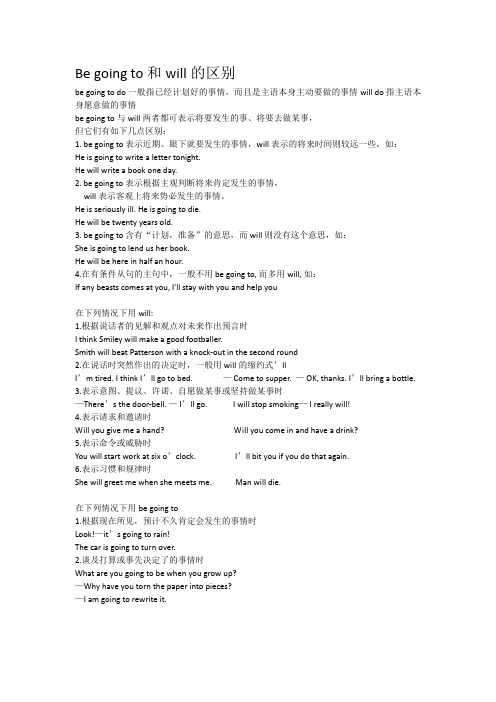will-和-be-going-to的区别
will与be going to 区别

预测 计划 意愿
The toilet paper has been used up.
be going to
计划
I am going to get some today. 知道啦,早就打算去买呢
will
意愿
I will get some today. 哦,马上去买
will
be going to
Debbie Hart is going to swim across the English Channel tomorrow. — NCE2 Lesson 36 Mr.Thompson is going to sell it because it is haunted. — NCE2 Lesson 47
My girlfriend has bought some wool and she ______kint a sweater for me .
She is going to set out from the French coast at five o'clock in the morning.
情景表达
郭晶晶站在跳板边缘并向前倾斜,这时我们 说: A.She is going to dive into the water. B.She will dive into the water.
情景表达
郭晶晶站在跳板边缘并向前倾斜,这是我们 说: A.She is going to dive into the water. B.She will dive into the water.
My girlfriend has bought some wool and she ______knit a sweater for me .
Be-going-to-和will的区别

Be going to 和will的区别be going to do 一般指已经计划好的事情,而且是主语本身主动要做的事情will do 指主语本身愿意做的事情be going to与will的区别be going to与will两者都可表示将要发生的事、将要去做某事,但它们有如下几点区别:1. be going to 表示近期、眼下就要发生的事情,will 表示的将来时间则较远一些,如:.He is going to write a letter tonight.He will write a book one day.2. be going to 表示根据主观判断将来肯定发生的事情,will表示客观上将来势必发生的事情。
He is seriously ill. He is going to die.He will be twenty years old.,3. be going to 含有“计划,准备”的意思,而 will 则没有这个意思,如:She is going to lend us her book.He will be here in half an hour.4.在有条件从句的主句中,一般不用 be going to, 而多用will, 如:If any beasts comes at you, I'll stay with you and help you·will 和be going to的区别在下列情况下用will:1.根据说话者的见解和观点对未来作出预言时I think Smiley will make a good footballer.Smith will beat Patterson with a knock-out in the second round.:2.在说话时突然作出的决定时,一般用will的缩约式’llI’m tired. I think I’ll go to bed.— Come to supper.—OK, thanks. I’ll bring a bottle.3.表示意图、提议、许诺、自愿做某事或坚持做某事时—There’s the door-bell. —I’ll go.》I will stop smoking— I really will!4.表示请求和邀请时Will you give me a handWill you come in and have a drink5.表示命令或威胁时@You will start work at six o’clock.I’ll bit you if you do that again.6.表示习惯和规律时She will greet me when she meets me.Man will die.在下列情况下用be going to`1.根据现在所见,预计不久肯定会发生的事情时Look!—it’s going to rain!The car is going to turn over.2.谈及打算或事先决定了的事情时What are you going to be when you grow up:—Why have you torn the paper into pieces—I am going to rewrite it.附加内容:将来时的六种表示方法be going to do将会...%一般用于将来时态例句与用法:1. I am assuming that the present situation is going to continue.我认为目前的情况将会继续下去.2. It's going to cost 200 or as near as dammit.这要花200英镑上下.3. How did you find out that Burns was going to be promoted你是怎么知道伯恩斯将会得到提升的]4. You must be out of your mind if you think I'm going to lend you 50! 你以为我会借给你50英镑, 你准是疯了!5. I'm just going to check in these books at the library.我要去图书馆还这些书。
be-going-to-结构以及与will区别以及练习

2017.11.26“be going to" 结构一、“be going to"表示将要发生的事或打算、计划、安排要做的事。
它是一般将来时的一种表达形式,其后常有表示将来的时间状语.如:tomorrow, next week等.例如:We are going to play football tomorrow。
明天我们将去踢足球。
二、构成:be going to +动词原形。
在be going to 结构中,be随主语人称和数的变化而变化,而going to 固定不变。
例如:He is going to clean the classroom tomorrow.They are going to clean the classroom tomorrow。
三、句式变化:be going to 结构的句式变化都可在be上完成。
变疑问句时,将be提至主语之前;变否定句在be后加not。
例如:They are not going to have a picnic next week.下星期他们将不去野餐。
Are they going to have a picnic next week?下星期他们将去野餐吗?What are they going to do next week?下星期他们打算干什么?四、“be going to +动词原形"的用法。
1。
表示主语打算、安排在最近或将来要做某事或出现的某种状态。
这种主观意图,一般已做过事先安排,故其实现的可能性较大,其主语常是人.例如:We are going to swim next Sunday.下星期天我们打算去游泳。
(已打算好下星期天去游泳)2。
表示根据现有情况、某种迹象,判断将要或即将发生的动作。
此时不含有主观意图,只是表示说话人对客观事态发展的判断或推测,此时主语可以是人,也可以是物。
例如:Look! It’s going to rain。
will与be-going-to的差别

be going to与will两者都可表示将要发生的事、将要去做某事,但它们有如下几点差别:1. be going to 表示近期、眼下就要发生的事情,will 表示的将来时间则较远一些,如:He is going to write a letter tonight。
He will write a book one day.2。
be going to表示根据主观判断将来绝对发生的事情,will表示客观上将来势必发生的事情。
如:He is seriously ill. He is going to die。
He will be twenty years old.3。
be going to含有“打算,准备"的意思,而will则没有这个意思,如:She is going to lend us her book。
He will be here in half an hour。
4.在有条件从句的主句中,一般不用be going to,而多用will.如:If any beast comes at you,I’ll stay with you and help you.5。
will可以表示主动为他人做某事或是给出一个承诺,可以翻译为‘为'和‘会’。
It is very cold. I will make you some hot coffee. If you take part in the election, I will support you.请看一道题:—I’ve come out without any money.Never mind I __________ you some。
A. am going to lend B。
will lend C. have lent D. am to lend【分析】此题应选B。
容易误选A.这里主要谈一谈有关“will+动词原形"和“be going to+动词原形”的区别:在通常情况下两者都可表示将来时间和意图,且有时可换用:我不会告诉你这事的。
Be going to 和will 将来时的几种表达方式

Be going to 和will的区别be going to do 一般指已经计划好的事情,而且是主语本身主动要做的事情 will do 指主语本身愿意做的事情be going to与will两者都可表示将要发生的事、将要去做某事,但它们有如下几点区别:1. be going to 表示近期、眼下就要发生的事情,will 表示的将来时间则较远一些,如:He is going to write a letter tonight.He will write a book one day.2. be going to 表示根据主观判断将来肯定发生的事情,will表示客观上将来势必发生的事情。
He is seriously ill. He is going to die.He will be twenty years old.3. be going to 含有“计划,准备”的意思,而 will 则没有这个意思,如:She is going to lend us her book.He will be here in half an hour.4.在有条件从句的主句中,一般不用 be going to, 而多用will, 如:If any beasts comes at you, I'll stay with you and help you在下列情况下用will:1.根据说话者的见解和观点对未来作出预言时I think Smiley will make a good footballer.Smith will beat Patterson with a knock-out in the second round2.在说话时突然作出的决定时,一般用will的缩约式’llI’m tired. I think I’ll go to bed. — Come to supper. — OK, thanks. I’ll bring a bottle.3.表示意图、提议、许诺、自愿做某事或坚持做某事时—There’s the door-bell. — I’ll go. I will stop smoking— I really will!4.表示请求和邀请时Will you give me a hand? Will you come in and have a drink?5.表示命令或威胁时You will start work at six o’clock. I’ll bit you if you do that again.6.表示习惯和规律时She will greet me when she meets me. Man will die.在下列情况下用be going to1.根据现在所见,预计不久肯定会发生的事情时Look!—it’s going to rain!The car is going to turn over.2.谈及打算或事先决定了的事情时What are you going to be when you grow up?—Why have you torn the paper into pieces?—I am going to rewrite it.将来时的六种表示方法:be going to do 将会... 一般用于将来时态1. I am assuming that the present situation is going to continue.我认为目前的情况将会继续下去.2. It's going to cost 200 or as near as dammit. 这要花200英镑上下.3. How did you find out that Burns was going to be promoted?你是怎么知道伯恩斯将会得到提升的?4. You must be out of your mind if you think I'm going to lend you 50!你以为我会借给你50英镑, 你准是疯了!5. I'm just going to check in these books at the library. 我要去图书馆还这些书。
will-和-be-going-to的区别教学内容

Will(shall) & be going to 将来时态区别一般将来时表示在将来某个时间要发生的动作或存在的状态。
一. 一般将来时的构成:1. 由助动词“ shall/ will +动词原形”构成,shall 用于第一人称,will 用于第二、第三人称,而美式英语在陈述句中无论什么人称,一律用will 。
2. 一般将来时的否定和疑问形式:一般将来时的否定形式是will not ,缩写为won't; shall not ,缩写为shan't 。
一般将来时的疑问形式是把will/ shall 提到主语前。
如:He won’t go to the park this Sunday. 本周日他不去公园。
Will you go swimming with me? 和我一起去游泳好吗?二. 一般将来时的基本用法:1. 表示“纯粹的将来”:①表示将要发生的动作或情况,常带有表示将来的时间状语,如tomorrow, next week, in two days, from now on 等。
如:It will be fine tomorrow. 明天天气晴朗。
②表示预料将要发生的动作或情况。
如:You will feel better after having this medicine. 吃了这药,你就会感觉好些的。
③表示由于习惯倾向而会经常发生的动作,本用法中的will 要重读。
如:Boys will be boys. 〔谚语〕男孩毕竟是男孩。
2. 表示“带有情态意义的将来”,用来表示意图,用will 来表示。
如:I will be more careful next time. 下次我要更加小心。
I won't go shopping this afternoon, but she will.今天下午我不想去购物,但她想去。
will 在疑问句中,用来表示有礼貌地征询对方的意见。
be going to do和will的用法

be going to do和will的用法"be going to do"和"will"都用于表示将来的意思,但是在用法上有一些差异。
"be going to do"表示你已经有了一个决定或打算将要发生的事情。
它通常用于表达个人的打算和计划,或是基于当前的情况和观察做出的推测。
例如:- I am going to visit my parents this weekend.(我打算这个周末去看望我的父母。
)- Look at those dark clouds! It's going to rain soon.(看那些乌云!很快要下雨了。
)"will"则更加普遍和通用,可以用来表示即将发生的事情,或基于主观愿望和假设的事情。
它通常用于表达意图、请求、预测、承诺等。
例如:- I will help you with your project.(我会帮你完成你的项目。
)- Will you please pass me the salt?(请你把盐递给我好吗?)- I think it will be a sunny day tomorrow.(我认为明天会是个晴天。
)除此之外,"will"还可用于表述习惯、能力和意愿。
例如:- She will always arrive late.(她总是会迟到。
)- He will play the guitar for hours.(他可以弹吉他几个小时。
)- They won't listen to our advice.(他们不愿意听取我们的建议。
)需要注意的是,有时候"be going to"和"will"可以互换使用,但在特定语境下可能更常用一种。
另外,"be going to"通常强调计划已经安排好或情况已经明确,而"will"则可以表达更加主观的意愿和预测。
be-going-to和will异同点

be going to与will的区别be going to与will两者都可表示将要发生的事、将要去做某事,但它们有如下几点区别:1. be going to表示近期、眼下就要发生的事情,will表示的将来时间则较远一些,如:He is going to write a letter tonight.He will write a book one day.2. be going to表示根据主观判断将来肯定发生的事情,will表示客观上将来势必发生的事情。
He is seriously ill. He is going to die.He will be twenty years old.3. be going to含有“计划,准备”的意思,而will则没有这个意思,如:She is going to lend us her book.He will be here in half an hour.4.在有条件从句的主句中,一般不用be going to, 而多用will, 如:If any beasts come at you, I'll stay with you and help youwill和be going to的选用原则1. 关于“打算”原先作好的打算用“be going to”。
“Kate is in hospital.”“Yes, I know. I am going to see her this afternoon.”“凯特在住院。
”“是的,我知道。
我下午要去看她。
”说话时即时的打算用“will”。
“Kate is in hospital.”“Oh, really, I didn’t know. I will go and see her at once.”“凯特在住院。
”“哦,是吗?我都不知道呢。
我得马上去看她。
”2. 关于“预料”在有迹象表明的情况下的预料用“be going to”Look at the clouds. It’s going to rain.你看天上的云。
- 1、下载文档前请自行甄别文档内容的完整性,平台不提供额外的编辑、内容补充、找答案等附加服务。
- 2、"仅部分预览"的文档,不可在线预览部分如存在完整性等问题,可反馈申请退款(可完整预览的文档不适用该条件!)。
- 3、如文档侵犯您的权益,请联系客服反馈,我们会尽快为您处理(人工客服工作时间:9:00-18:30)。
Will(shall) & be going to 将来时态区别一般将来时表示在将来某个时间要发生的动作或存在的状态。
一 . 一般将来时的构成:1. 由助动词“ shall/ will +动词原形”构成,shall 用于第一人称,will 用于第二、第三人称,而美式英语在陈述句中无论什么人称,一律用will 。
2. 一般将来时的否定和疑问形式:一般将来时的否定形式是will not ,缩写为won't; shall not ,缩写为shan't 。
一般将来时的疑问形式是把will/ shall 提到主语前。
如:He won’t go to the park this Sunday. 本周日他不去公园。
Will you go swimming with me? 和我一起去游泳好吗?二 . 一般将来时的基本用法:1. 表示“纯粹的将来”:①表示将要发生的动作或情况,常带有表示将来的时间状语,如tomorrow, next week, in two days, from now on 等。
如:It will be fine tomorrow. 明天天气晴朗。
②表示预料将要发生的动作或情况。
如:You will feel better after having this medicine. 吃了这药,你就会感觉好些的。
③表示由于习惯倾向而会经常发生的动作,本用法中的will 要重读。
如:Boys will be boys. 〔谚语〕男孩毕竟是男孩。
2. 表示“带有情态意义的将来”,用来表示意图,用will 来表示。
如:I will be more careful next time. 下次我要更加小心。
I won't go shopping this afternoon, but she will.今天下午我不想去购物,但她想去。
will 在疑问句中,用来表示有礼貌地征询对方的意见。
如:Will you have some more tea? 要不要再喝点茶?What shall we do this weekend? 本周末我们要干什么?三 . 一般将来时的其它几种表示法:1. 用be going to 表示:be going to 相当于一个助动词,与其后的动词原形一起构成句子的谓语,表示近期将要发生的动作或存在的状态。
如:I'm going to see a film this afternoon. 今天下午我想去看电影。
①“ be going to +动词原形”表示主观上打算在将来某个时间要做某事。
如:Her mother is going to buy her a new bike. 她妈妈要给她买辆新自行车。
②“ be going to +动词原形”还可以表示说话人根据已有的迹象认为将要发生的事。
如:It's going to rain. 快要下雨了。
2. 用一般现在时表示将来意义句中的动词是一般现在时,但所表示的意义却是一般将来时。
如:Are you free tomorrow? =Are you going to be free tomorrow? 你明天有空吗?在时间/ 条件状语从句中,如果主句是一般将来时,从句习惯上用一般现在时表示将来的意义。
如:Please tell him to go when he comes. 他来时,就让他去。
3. 用位置移动的行为动词的现在进行时表示将来意义:这些动词有come, go, leave, begin, arrive, start 等。
如:We are leaving tomorrow 。
我们明天要走了一般将来时练习:( ) 1. There __________ a meeting tomorrow afternoon.A. will be going toB. will going to beC. is going to beD. will go to be( ) 2. Charlie ________ here next month.A. isn’t workingB. doesn’t workingC. isn’t going to workingD. won’t work( ) 3. He ________ very busy this week, he ________ free next week.A. will be; isB. is; isC. will be; will beD. is; will be ( ) 4. There ________ a dolphin show in the zoo tomorrow evening.A. wasB. is going to haveC. will haveD. is going to be( ) 5. –________ you ________ free tomorrow?– No. I ________ free the day after tomorrow.A. Are; going to; willB. Are; going to be; willC. Are; going to; will beD. Are; going to be; will be( ) 6. Mother ________ me a nice present on my next birthday.A. will givesB. will giveC. givesD. give ( ) 7. – Shall I buy a cup of tea for you?–________. (不,不要。
)A. No, you won’t.B. No, you aren’t.C. No, please don’t.D. No, please.( ) 8. – Where is the morning paper?– I ________ it for you if you want it at once.A. getB. am gettingC. to getD. will get ( ) 9. ________ a concert next Saturday?A. There will beB. Will there beC. There can beD. There are( ) 10. If they come, we ________ a meeting.A. haveB. will haveC. hadD. would have ( ) 11. He ________ her a beautiful hat on her next birthday.A. givesB. gaveC. will givingD. is going to give( ) 12. He ________ to us as soon as he gets there.A. writesB. has writtenC. will writeD. wrote( ) 13. He ________ in three days.A. coming backB. came backC. will come backD. is going to coming back( ) 14. If it ________ tomorrow, we’ll go roller-skating.A. isn’t rainB. won’t rainC. doesn’t rainD. doesn’t fine( ) 15. – Will his parents go to see the T erra Cotta Warriors tomorrow?– No, ________ (不去).A. they willn’t.B. they won’t.C. they aren’t.D. they don’t.1. C 这个句型是there be与be going to的结合,结合后是there is going to be。
2. D A是进行时态的,B与C 构成都有问题,doesn’t 与be going to 后面都应该放动词原型。
3. D 根据时间状语this week和next week断定出前半句一般现在时,根据后半句判断应该是一般将来时。
4. D 理由同第一题的一样。
5. D be free是固定搭配,所以无论是用be going to句型还是用will句型都不能少了be。
6. B.. 根据next birthday判断,这个句子应该是一般将来时的,它的构成应该是will + 动词原形。
7.C 事实上这个句子不是一般将来时,是一个请求别人许可的句子。
所以回答的时候应该比较客气。
8.D at once 是一个一般将来时的时间状语,所以这个用一般将来时。
9.B 从句子结尾的问号看,这个句子是问句,只有B选项是按照问句的形式给出的。
10.B 这是一个典型的主将从现的句型,条件从句是现在时的,主句应该是将来时的。
11.D on her next birthday.这个时间状语说明时态上应该是一般将来时。
12.C 这是一个典型的主将从现的句型,时间状语从句是现在时的,主句应该是将来时的。
13.C in three days是一个一般将来时的时间状语,意思是三天以后,所以是一般将来时的句子。
14.C 这是一个典型的主将从现的句型,主句是将来时的,条件从句应该是现在时的。
15.B 所问要所答。
